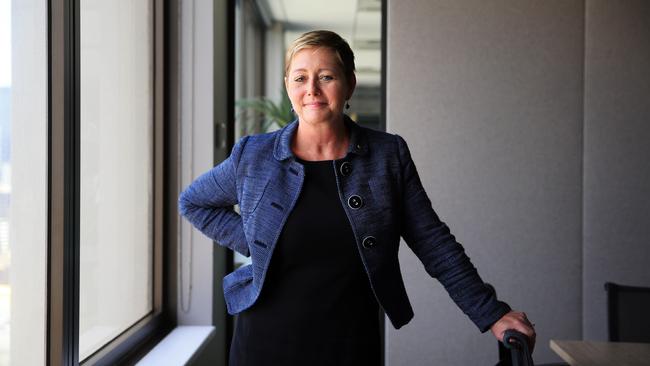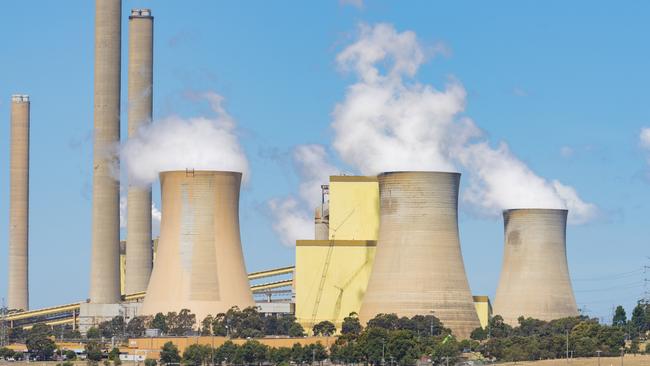Avalanche of cash to silence climate sceptics
This year is likely to be remembered for the financial industry’s ‘phenomenal’ pivot on climate change.

Louise Davidson, whose voice is amplified by the $2.2 trillion pool of savings invested by her fund-manager members, acknowledges the risk of becoming “overwhelmed” by the unremitting deluge of data and bad news about a climate apocalypse.
Last Monday, for example, the world’s leading climate scientists warned in the sixth Intergovernmental Report on Climate Change that the prospect of limiting global warming to 1.5C would be out of reach within 12 years.
Recent changes in the climate were widespread, rapid and intensifying, and unprecedented in thousands of years. With every region of the world affected in “multiple” ways, the IPCC issued a clarion call for immediate, rapid and large-scale reductions in greenhouse gas emissions.
Far from being overwhelmed, however, Davidson, the chief executive of the Australian Council of Superannuation Investors, projects a determined optimism.
“Fundamentally, I have great confidence that we can address the issues,” she says.
“It’s not too late but we have to move now, particularly from an investment perspective because it’s such a material financial issue that it would be negligent not to do so.”
Davidson is optimistic that net zero emissions can be achieved by 2050 in line with the Paris Agreement. It may well be that historians look back on 2021 as a tipping point – the year when global capital recognised the scale of the risk and started to mobilise.
Capital is the irresistible force that will silence a dwindling cohort of climate sceptics in the boardroom, and even the most passionate deniers in the community. There’s not much point howling into the wind over a disused coal mine if banks won’t fund it, investors take a pass and insurers go goggle-eyed at the risk. Stranded asset, anyone?

Tim Buckley, a former Citigroup head of equities research who is now director of energy finance studies at the Institute for Energy Economics and Financial Analysis, says the global financial industry has pivoted “phenomenally” on climate this year.
It began with former Bank of England governor Mark Carney chairing the Glasgow Financial Alliance for Net Zero, which enshrined 1.5C of warming as part of the net zero by 2050 target – less than the 2C benchmark in the Paris Agreement.
GFANZ brought together more than 160 firms with $US70 trillion in assets to mobilise the trillions of dollars necessary to build a zero-emissions global economy.
By July, three months later, more firms had joined to take the group’s total assets figure to $US88 trillion, up 26 per cent.
The next extraordinary development was the traditionally fossil fuel-funded International Energy Agency releasing its road map for the global energy sector called “Net Zero by 2050”.
The report confirmed that the 1.5C pledge meant no new coal, oil or gas projects globally, with immediate effect.
Finally, the public conversion of Larry Fink, chairman and chief executive of the world’s biggest asset manager BlackRock, to the climate-change cause was a defining moment.
When an entity with $US9 trillion under management and a figure as influential as Fink makes such a profound call, others ignore it at their peril.
Fink’s forecast of a “seismic reallocation of capital” is already occurring, with Bloomberg reporting in June that $US60.9bn had flowed into exchange-traded funds with a focus on environmental, social and governance issues since the beginning of the year.
The 12-month figure was $US112.5bn.

“Australian corporates which fail to heed this global trend are clearly now on notice, no matter what [Resources Minister] Keith Pitt demands, and irrespective of what new fossil fuel subsidies [Energy Minister] Angus Taylor proposes,” IEEFA’s Buckley says.
“The IPCC report highlights that extreme weather events are becoming more frequent and more extreme, bringing home the point that the cost of continuing inaction is too high.
“Somehow [Deputy Prime Minister] Barnaby Joyce got this arse about, again,’’ Buckley says.
“And when billionaires like [Fortescue Metals founder]) Andrew Forrest and [Indian conglomerate Reliance Industries’ largest shareholder] Mukesh Ambani have world-leading net zero pledges for 2030 and 2035 respectively, and have committed to investing hundreds of billions of dollars in industries of the future, they have clearly decided to lead, irrespective of government inaction.”
Unsurprisingly, the explosion of global interest in all things ESG, particularly climate, has created booming demand for people with the right skills, both on the corporate and investor side.
Big super funds are engaging extensively with Australia Inc over their transition plans to net zero.
The nation’s largest super fund, AustralianSuper with $225bn in member assets, has built up a team of seven ESG experts in recent years and will add to it significantly over the next three to five years, creating new positions in London and New York.
Director ESG and stewardship Andrew Gray says the fund believes the economic transition to net zero will deliver the lowest economic-cost climate change outcome – and the best investment outcomes – for members.
“In order to achieve this, we engage regularly with the boards and senior management of ASX200 companies,” Gray says.
“In addition, our engagement is evolving to cover work on a number of issues in co-operation with companies that support net zero 2050 commitments, including that they formulate and enunciate decarbonisation strategies; that capex is aligned with their net zero goals; that there is alignment in any climate change policy advocacy they undertake, and that the company has the necessary governance to ensure effective and cost-effective implementation of the net zero goal.”
One of the problems is that ESG reporting is an immature and inexact science.
The Financial Stability Board, established by the G20 to make recommendations about the global financial system, created the Task Force on Climate-Related Financial Disclosures to improve and increase reporting of climate-related financial information.
However, there’s a lot of data and information about emissions and targets in company sustainability reports, which are not audited and lack consistency and rigour.
Such is the level of market interest that there are calls to mandate disclosure, including emissions reporting in the audited financial accounts.
While ACSI doesn’t have a formal position on the issue, Davidson says her personal view is that assurance of non-financial data is a “useful” reform to consider.
“It’s inevitable that as consideration of ESG issues become more sophisticated, there will be an expectation that data is more rigorous and potentially assured,” she says.
An example just this week was Commonwealth Bank’s update of its climate policy, which attracted the wrath of Market Forces.
The activist group said that, despite CBA’s pledge to achieve net zero by 2050, the policy set expected “glide paths” for emissions from key fossil fuel sectors that were aligned with an IEA sustainable development scenario to achieve the target by 2070.
A CBA spokesman responded that the scenario was consistent with the Paris Agreement, and used the best, currently available data relied on by peer banks globally. “In our annual report, we have said that we will review our reference scenario within the next 12 months having regard to the availability and quality of data,” he said.
“We remain committed to playing our part in limiting climate change in line with the goals of the Paris Agreement and supporting the transition to net zero emissions by 2050.”
Market Forces was unconvinced, accusing CBA of “aiming for failure” amid global efforts to prevent catastrophic climate change and lodging a shareholder resolution for consideration at the October 13 annual meeting.
The resolution calls for a commitment to no longer provide funding for new fossil fuel projects and targets to cut CBA’s fossil fuel exposure consistent with net zero by 2050.
Coincidentally, it emerged yesterday that the required data to update CBA’s reference scenario will also become available on October 13, the day of the bank’s annual meeting.
It wasn’t quite the reception the bank was hoping for when it began the laborious process of rewriting its climate policy.
In response to criticism of the blueprint, chief executive Matt Comyn was unrepentant.
Appearing on ABC radio on Thursday, Comyn denied that the move to sustainability funding rather than low-emissions funding amounted to a weakening of CBA’s climate commitments.
He also defended the bank’s funding of the emissions-heavy Permian Highway gas pipeline in Texas, and its co-funding of Santos’s purchase of a 37.5 per cent interest in the proposed Barossa gas field. CBA, Comyn said, had done a lot of work in the last 12 months.
“We have increased the transparency and specificity of exactly what we are doing,” he said.





To join the conversation, please log in. Don't have an account? Register
Join the conversation, you are commenting as Logout